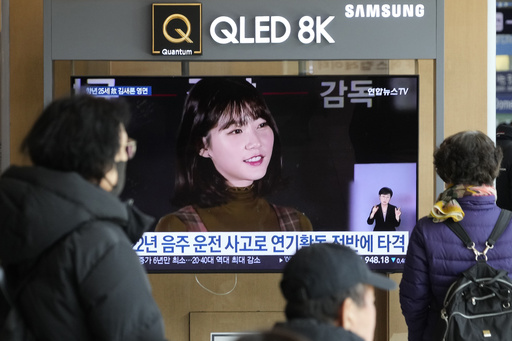
SEOUL, South Korea — In the nearly three years between her DUI incident in May 2022 and her tragic passing, South Korean actress Kim Sae-rom became the topic of extensive media scrutiny, with about 2,000 stories published about her by mainstream outlets. This situation highlights how the local press often sensationalizes the decline of a celebrity’s public image. Once a celebrated figure in the entertainment industry, Kim faced harsh backlash for her drunk driving, her candid discussions about financial hardships following a loss of roles, her job at a coffee establishment, her attempts to revive her career in theater, and even for enjoying outings with friends rather than displaying visible remorse. Upon her untimely death at the age of 24, media narratives shifted towards advocating for reform in how the industry and its stars are treated.
Kim’s passing, suspected to be a result of suicide according to law enforcement, adds to an alarming trend of high-profile celebrity deaths in South Korea. Many experts believe the intense pressure from the media plays a significant role in these tragedies, which highlights a darker side of fame that is often magnified by relentless public scrutiny and an unforgiving press that highlights every misstep.
In South Korea, the media landscape is particularly unforgiving towards its celebrities, especially women. Kim first gained recognition as a child when she starred in “The Man from Nowhere” in 2010, subsequently earning praise for her performances in both films and television series. However, this status was shattered following her impaired driving incident in May 2022, when she crashed her vehicle into a tree and electrical equipment in southern Seoul. Following the accident, she attempted to quell the negative attention by issuing a handwritten apology on social media and even compensated local businesses affected by the temporary power outage. However, these efforts did little to alleviate the media’s negative focus, making it increasingly difficult for her to secure acting opportunities. In April 2023, a Seoul court slapped a fine of 200 million won (approximately $139,000) on Kim for the incident, pushing her to express her panic over media portrayals, which she claimed were riddled with inaccuracies. “I’m too scared to say anything about them,” she revealed to reporters.
Post-incident, various entertainment gossip channels proliferated on platforms like YouTube, producing videos that negatively framed her personal life, including assertions—unsupported by evidence—about her exaggerating her financial woes while working in a café. These channels suggested that social media posts displaying her interactions with friends indicated a lack of remorse for her past actions. Celebrities, particularly women, have often found it challenging to regain their footing after similar legal troubles, whether it be related to intoxication or substance misuse, leading many to hesitate in seeking mental health assistance due to fears of further damaging press coverage. Kwon Young-chan, a former comedian and now an advocate for the mental health of celebrities, noted that many public figures feel helpless when facing a decline in public favor after years of maintaining a positive image. Kwon mentions that Kim’s family is considering legal steps against a prominent YouTube creator for what they believe to be baseless accusations regarding her private life.
The surge of high-profile deaths has prompted critical examination of how media organizations handle the personal affairs of celebrities and the potential toll negative online commentary has on their mental well-being. This scenario mirrors prior tragic incidents such as the 2008 suicide of film star Choi Jin-sil and the deaths of K-Pop idols Sulli and Goo Hara in 2019. In Kim’s case, police determined there were no signs of foul play, and she had left no farewell note, but the discourse around celebrity media treatment intensified. Hyun-jae Yu, a communications expert at Sogang University, expressed concern over how traditional media outlets frequently recycle sensationalized, unverified claims from social media to capture audience attention, leading to a spiraling effect fueled by competition for viewership.
In light of the deaths of Sulli and Goo Hara—attributed largely to the effects of cyberbullying—legislators previously proposed measures intended to mitigate harmful online comments, including initiatives for real-name verification and more stringent controls over hate speech and misinformation online. However, significant legislative changes have yet to materialize.
Management agencies in South Korea have taken more decisive actions to safeguard their clients from online harassment, with major companies like Hybe pursuing lawsuits against individuals who make malicious comments on social media. Nevertheless, Yu emphasizes the necessity for mainstream media to tighten self-regulation and limit their dependence on YouTube content, urging authorities to hold social media companies accountable for user-generated content by actively removing problematic posts and limiting monetization for creators promoting harmful content. In response to inquiries, a spokesperson for Google, the parent company of YouTube, did not provide a comment.
Heo Chanhaeng, an executive from the Center for Media Responsibility, suggested that news outlets and platforms should contemplate disabling comment sections on entertainment articles. He stated, “Her private life was indiscriminately reported beyond what was necessary. That’s not a legitimate matter of public interest.” The industry is left grappling with the need for reforms that would responsibly protect the mental health of celebrities while preserving the principles of public accountability in reporting.

